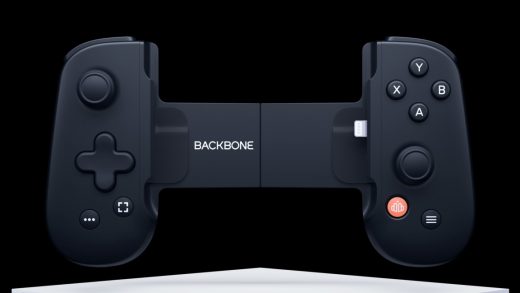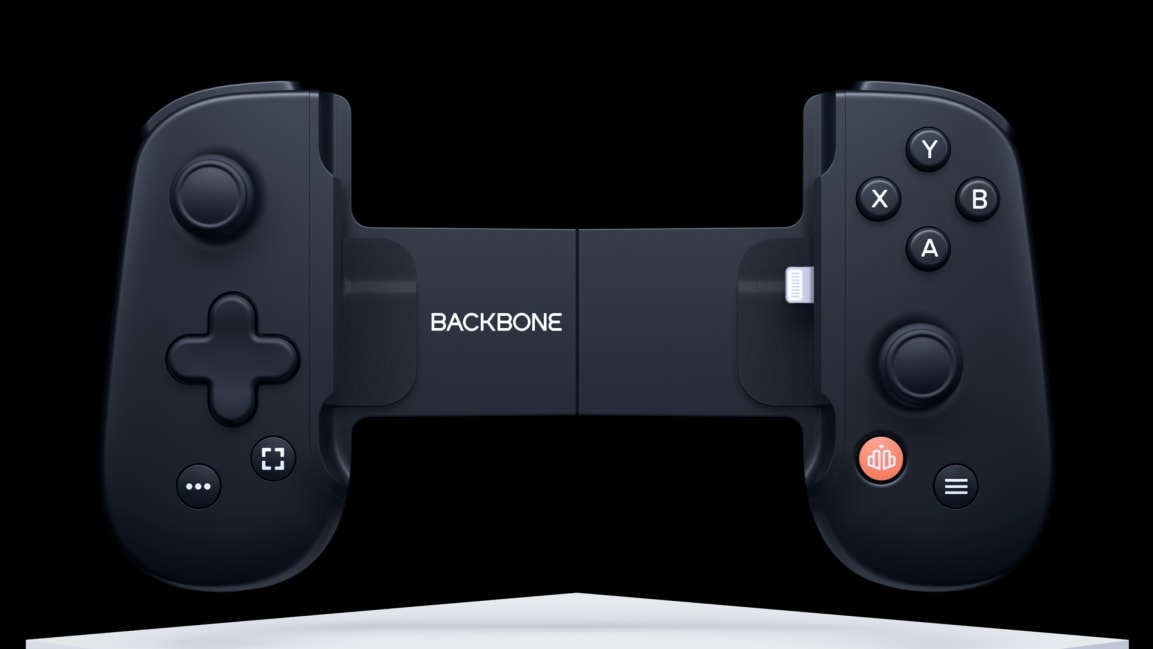This nifty iPhone game controller is a victim of Apple’s App Store fights
For the past week, my iPhone XR has been pulling double duty as a portable gaming system. I’ve been tearing up opponents in Call of Duty Mobile, tapping into my entire PC gaming library via Steam Link, and getting more precise control over Apple Arcade games such as Oceanhorn 2.
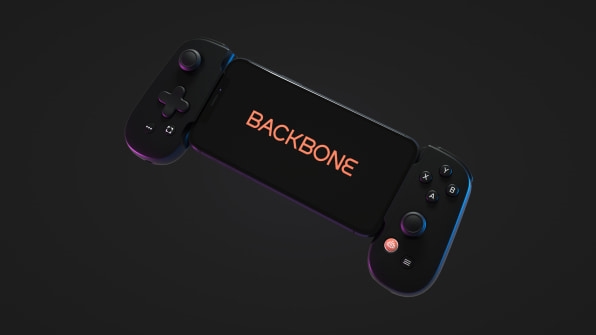
But while Backbone makes mobile games more fun, it’s arriving at an awkward time. Fortnite, one of the world’s most popular games, is currently unavailable in the iOS App Store due to developer Epic Games’ ongoing broyges with Apple over in-app purchase rules. Apple’s also made its platform inhospitable to cloud gaming services such as Microsoft’s xCloud, Nvidia’s GeForce Now, and Google’s Stadia, with rules that hinder those services’ ability to operate.
The result is a device that feels like it could transform mobile gaming—if only Apple got out of the way.
More than a controller
Backbone isn’t the first company to bring physical game controls to the iPhone. Lots of traditional game controllers are already compatible with the iPhone over Bluetooth, and you can buy clip-on mounts to keep the phone propped up above your hands. Backbone’s particular design, which wraps around the iPhone in landscape mode and plugs into the Lightning port at one end, also has a close equivalent in Razer’s Kishi controller.
But Maneet Khaira, Backbone’s founder and CEO, says the goal was to create more than just a hardware accessory. “We really are just as interested, if not more interested, in software as the hardware,” he says.
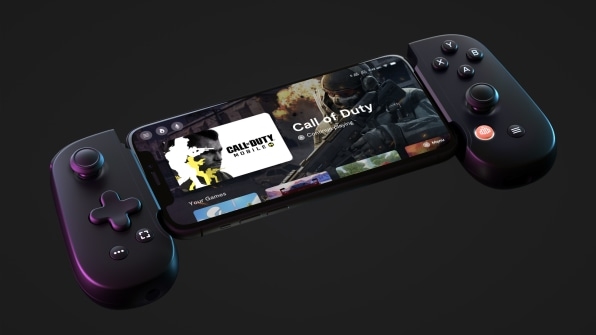
The main advantage of Backbone is its companion app, which is intertwined with the hardware in several ways. Pressing the orange button on the right-hand controller brings up a menu of controller-friendly games to play. From here you can start a voice chat with friends that works across any app.
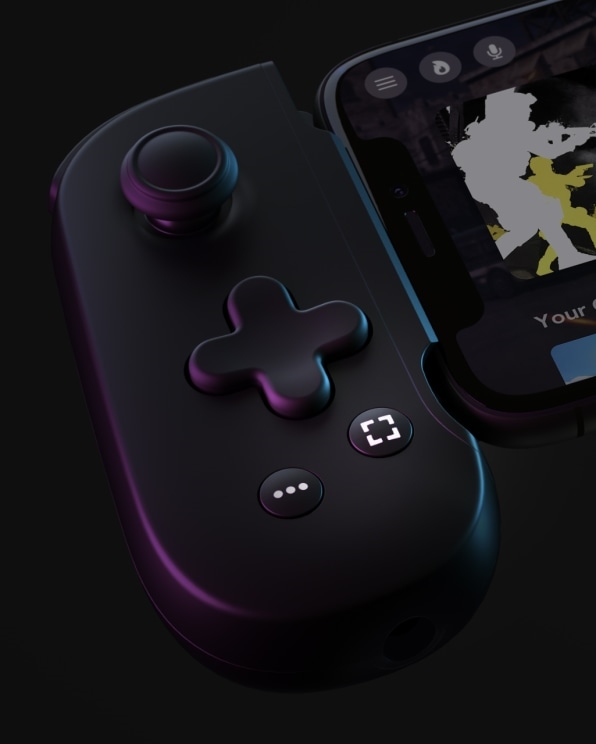
Backbone’s controller also has a button for capturing in-game video footage or taking screenshots, and the app has a built-in editor for creating short highlights. You can share those highlights to any messaging app or social media channel, while friends that use Backbone can automatically see your latest clips. The controller even helpfully shows a red-light ring around its launch button when screen recording is active, and it tries to dampen the sound from button clicks while you’re chatting with friends.
Khaira, who’s running a startup for the first time, says the idea for Backbone arose in mid-2018, when he was interning at YouTube and living in a house with four friends. They all wanted to play Fortnite on their phones but felt the experience could have been better. Physical controls were an obvious missing piece, but so was cross-game voice chat and an easy way to record and share gameplay footage.
“Our idea was that by addressing the three of those things cohesively and at the same time, you can create, hopefully, an experience that would be greater than the sum of the individual parts,” he says.
A great time for mobile gaming
Looking at the state of mobile gaming as a whole, this feels like the right moment for a product such as Backbone.
When Apple added a game controller support standard to iOS in 2013, not many games used it, and the ones that did were mostly ports of older games (for instance, Sonic the Hedgehog) or weak imitations of modern console games. Now, the lines between mobile and console have blurred.
Popular streaming personalities—MrBeast, Typical Gamer, and Nadeshot—have invested in Backbone and plan to promote it.
Fortnite, for instance, had 116 million registered users on iOS, playing the exact same game as PC and console owners. Call of Duty Mobile has more than 300 million iOS downloads and feels legitimately like one of its console cousins. Microsoft has unified its mobile, console, and Windows versions of Minecraft so that everyone can play together. Meanwhile, companies such as Microsoft, Google, and Amazon are trying to bring modern PC and console games to smartphones through cloud game streaming.
Compared to the early days of iOS controller support, “it’s a very, very different landscape now that has ballooned,” Khaira says.
“Squabbling” with Apple
Because mobile gaming is changing, it’s also leading to more clashes between Apple and other companies such as Epic, Google, and Microsoft.
In Epic’s case, Apple removed Fortnite from the App Store after Epic tried to install its own payment system for in-game items. That violated Apple’s rules that require all games to use its in-app payment system, entitling Apple to 30% of revenues. While Epic hopes the standoff will yield broader platform changes, Apple has held firm, saying it won’t let Epic back until it follows the rules like everyone else.
Apple has also indicated that it won’t allow cloud gaming services such as Microsoft’s xCloud and Google’s Stadia to offer entire game catalogs through a single app. As CNBC reported last month, these companies will have to submit individual games to the App Store, offer some free functionality within them, and allow users to upgrade via an in-app purchase. (Amazon’s Luna service operates through a web browser as a workaround.)
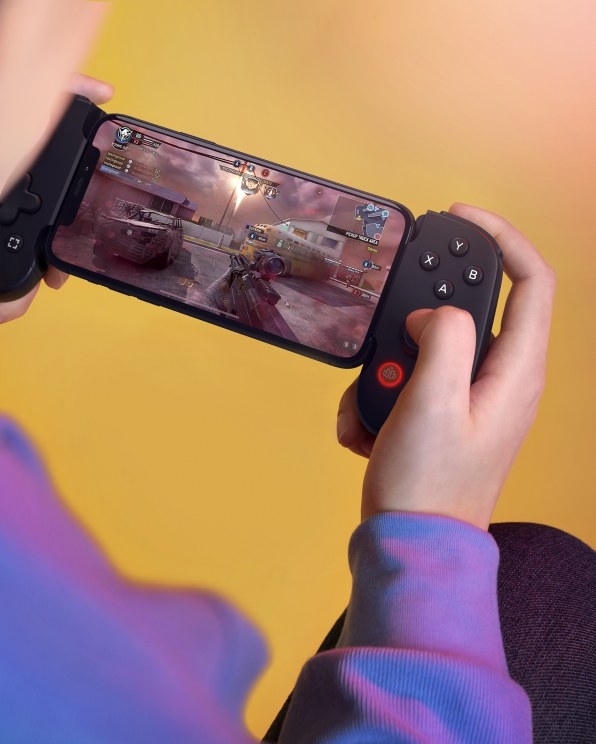
Khaira sounds disappointed that these games and services can’t work with Backbone—Fortnite, after all, was the project’s original motivation—but notes that iOS was essential for what the startup wanted to accomplish. Backbone’s video capture feature, for instance, relies on screen-recording features that are built into iOS, and Apple’s superior memory management capabilities, which can automatically shut down screen recording without hindering gameplay if the system is using too much memory.
Bringing Backbone to Android, which has been more amenable to cloud gaming services and still supports Fortnite via sideloading and Samsung’s app store, would have been trickier. Screen-capture support only arrived with this year’s Android 11 update, and most Android phones run older versions. Google is also planning to get stricter about enforcing its own in-app purchase rules next year, which could set the stage for more developer showdowns.
Ultimately, Backbone isn’t betting on any one particular game or service. Instead, the startup is making a long-term bet on mobile gaming in general, believing that the experience will continue to become more console-like. Backbone is a fine way to accelerate that process, even if it’s missing a few key games.
“People are still working out the business models,” Khaira says, “but the fact that there is dispute and squabbling over mobile games revenue is a testament to how big the industry is.”
(50)

